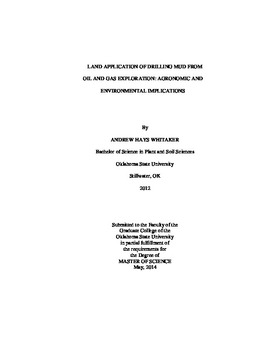| dc.contributor.advisor | Penn, Chad | |
| dc.contributor.author | Whitaker, Andrew Hays | |
| dc.date.accessioned | 2015-06-17T20:08:32Z | |
| dc.date.available | 2015-06-17T20:08:32Z | |
| dc.date.issued | 2014-05-01 | |
| dc.identifier.uri | https://hdl.handle.net/11244/15181 | |
| dc.description.abstract | Waste from oil and gas drilling is often disposed of through land application. These studies examined the agronomic and environmental impact of applying drilling mud to agricultural land. Specifically, we investigated the best methods for increasing TPH degradation from land applied oil-base drilling mud (OBM), and potential BTEX leaching, along with salt accumulation and leaching from water-base drilling mud (WBM) applied to wheat. This was achieved by conducting field and greenhouse leaching experiments. Mixing OBM with caliche, lime, or gypsum resulted in > 90% TPH degradation 60 days after application with no decrease in plant yield. BTEX leaching from surface applied OBM was minimal over 90 days and all BTEX leachate concentrations were below EPA drinking water thresholds. Increased surface applications of OBM resulted in decreased TPH degradation rates. Initial soil EC values were high after land applying WBM to wheat. Increased rainfall decreased soil EC levels by leaching salts out of the top 15 cm where the majority of roots occur for wheat. Depending on rainfall amounts, soil EC decreased below the saline threshold in 90-300 days. On average, it required 3 cm of rainfall to lower the soil EC by 1 mS cm-1 for the 0-7.5 cm depth. Soil SAR values increased at each sampling day although never reaching the sodic threshold. Application of WBM had no impact on wheat yield except at the March application date. The land application of drilling mud may not have a long term agronomic and environmental impact if correctly applied. However, detrimental results to soil and plants can occur if over-applied. | |
| dc.format | application/pdf | |
| dc.language | en_US | |
| dc.publisher | Oklahoma State University | |
| dc.rights | Copyright is held by the author who has granted the Oklahoma State University Library the non-exclusive right to share this material in its institutional repository. Contact Digital Library Services at lib-dls@okstate.edu or 405-744-9161 for the permission policy on the use, reproduction or distribution of this material. | |
| dc.title | Land Application of Drilling Mud from Oil and Gas Exploration: Agronomic and Environmental Implications | |
| dc.type | text | |
| dc.contributor.committeeMember | Warren, Jason | |
| dc.contributor.committeeMember | Zhang, Hailin | |
| osu.filename | Whitaker_okstate_0664M_13388.pdf | |
| osu.accesstype | Open Access | |
| dc.description.department | Plant & Soil Science | |
| dc.type.genre | Thesis | |
| dc.subject.keywords | application of drilling mud | |
| dc.subject.keywords | btex leaching | |
| dc.subject.keywords | drill cuttings | |
| dc.subject.keywords | oil and water based drilling mud | |
| dc.subject.keywords | salt leaching | |
| dc.subject.keywords | tph degradation | |
